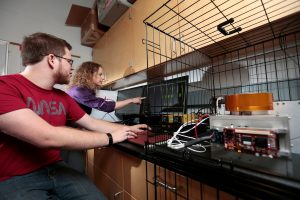Piloting an aircraft is popularly described as hours of boredom punctuated by periods of terror. Similarly, a spacecraft in transit to a distant target remains largely dormant, but for periodic heightened activity required for maintenance and staying on course. Aircraft and spacecraft are complex systems of systems that must seamlessly work together, switching control through a carefully orchestrated hierarchy.
Cyclone engineers, Phillip Jones, associate professor with the Iowa State University Department of Electrical and Computer Engineering (ECpE), along with Kristin Rozier, assistant professor from the Department of Aerospace Engineering, have been awarded a National Science Foundation (NSF) grant for $1.2 million for their research on computer and network systems in aircraft and spacecraft.
The research project that received the award is entitled: “Resource-Aware Hierarchical Runtime Verification for Mixed-Abstraction-Level Systems of Systems.” The start date for the grant is set for Jan. 1, 2021, and the end date is estimated to be on Dec. 31, 2023.
“The end goal of the project is to make these complicated systems safe. When these systems interact with society, we want to have confidence that people won’t get hurt and property won’t get damaged,” Jones said.
“One of the biggest challenges is how to define what it means to be safe. We need precise, unambiguous ways to capture safety requirements that are easy to validate, and then we need to design ways to analyze for those requirements in ways that are computationally efficient and enable the system to react in real-time, even when we only have partial information. Those are the goals of this project,” Rozier said.
Each on-board system presents its own verification challenge. Verifying that all levels work together in perfect harmony in the face of potentially unexpected environmental inputs can prove to be a difficult task.
“You design the system to do an action, but you have actions that emerge from the system as it performs,” Jones said.
Existing tools for runtime verification are not capable of obeying constraints imposed by running them on real systems or in real missions, and they do not have parameters to focus their computational demands on the tasks most impactful on system safety, the abstract for the study said.
This project aims to combine concepts from formal methods, control theory, hardware-software integration and software engineering to design runtime monitors that inspect cyber-physical systems without interfering with their normal operation.

“By granting our research proposal, the NSF Cyber-Physical Systems (CPS) program has funded a very exciting opportunity for a diverse team to design more intelligent cyber-physical systems, like aircraft and spacecraft,” Rozier said.
“Cyber-physical systems are everywhere in modern life, but they are also very challenging to analyze because they have both hardware and software components that interweave seamlessly to accomplish mission goals.”
Rozier, who is the principal investigator of the research project, has research interests in the areas of formal methods, verification and validation of safety-critical systems, design-time checking of system logic and requirements with applications in aerospace systems, system and safety health management for intelligent, autonomous unmanned aerial systems, model checking, automated reasoning, runtime monitoring, fault tolerance and many other areas.
Jones, the co-principal investigator from this study, researches systems and controls, computing and networking systems, embedded systems and system-on-chip architectures. An example of this is the technology in smart cars or in other smart appliances such as refrigerators.
“This project is a true representation of outstanding quality multidisciplinary research work in the College of Engineering and underscores the importance of hardware-software co-design in real-time systems,” said ECpE Professor and Palmer Department Chair Ashfaq Khokhar.